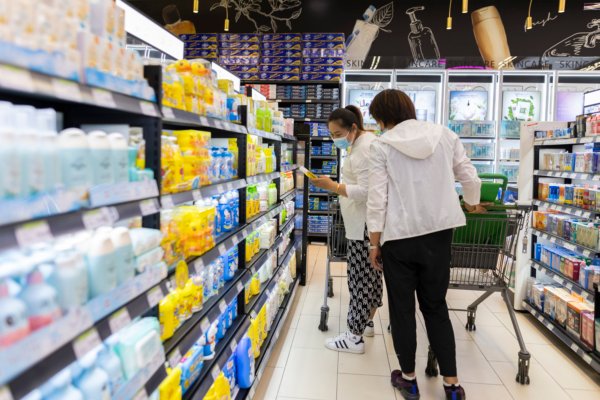The scandal of the collective “collapse” of Chinese sanitary napkin brands continues to escalate. Many people are rushing to purchase foreign brands of sanitary napkins, with reports of many women making special trips to Hong Kong and Japan to buy high-quality sanitary napkins. Some netizens have compared domestically produced sanitary napkins to pet pads, noting that the official standards for pet pads are surprisingly higher than those for this essential female product.
Recently, videos have surfaced online showing a large number of women flocking to a certain store to buy foreign brand sanitary napkins. Several videos shared by netizens show shelves being cleared out and many opting for bulk purchases.
According to the Beijing Business Daily, in recent days, several sanitary napkin brands have been exposed for “collapsing,” with the Pandalon sanitary napkin section catching fire. On November 25, “Pandalon sanitary napkin area subject to frenzy purchases” trended hotly on social media.
It has also been reported that many women are specifically traveling to Hong Kong and Japan to buy large quantities of high-quality sanitary napkins. Some mainland Chinese residents in Japan have also been seen frantically buying sanitary napkins, causing dissatisfaction among many Japanese. Chinese netizens jokingly commented that even the professional anti-Japanese activists are “off duty” at such times.
The root of the issue lies in many netizens’ measurements revealing that the actual lengths of various brands of sanitary napkins like ABC, Seventh Space, Kao, Elsker, Sofy, Whisper, and All Cotton Era are all shorter than the indicated lengths.
Furthermore, the response from ABC brand’s customer service that “if you can’t accept it, you don’t have to buy it” has exacerbated consumer dissatisfaction.
Recently, the founder of the ABC brand, Deng Jingheng, apologized, indirectly revealing the current state of the industry. Deng stated that the company strives to be the first in the industry to achieve a “zero negative difference to national standards.” By March 2025, all of their products will meet this standard, any deviation will be considered acceptable. This indicates that currently, no sanitary napkin company in the industry has achieved this “zero negative difference to national standards” status.
Reports suggest that the declining net profits may be a result of the sanitary napkin companies’ overall “cutting corners.” Among the major listed companies, Baiya Shares, Qiann Medical, Steady Medical, Haoyue Care, and the Hong Kong-listed company Heng’an International all have sanitary napkin brands.
Research from China-Thai Securities indicates that the structure of sanitary napkins primarily consists of the top layer, absorbent core, bottom layer, and adhesive. The absorbent core, the part that has been questioned for being “cutting corners” in this incident, accounts for the largest proportion of raw material costs, approximately 50%.
Liu Baoping, Director of the Guangzhou Huazhaoren Brand Design Institute, pointed out that “raw material costs account for a high proportion, approximately 80% of the total operating costs of sanitary napkins.” Even a few millimeters of deviation per sanitary napkin could result in significant cost savings when combined.
Aside from length, the national standards for pH levels and formaldehyde values of sanitary napkins have also sparked widespread criticism.
Ironically, the China Consumers Association claims that “the overall quality of domestically purchased branded sanitary napkins through legitimate channels is not inferior to those purchased from overseas.” However, according to media reports citing consumers, the current “National Standards for Sanitary Napkins (Pads)” (GB/T 8939-2018) sets the pH requirement for sanitary napkins at 4.0-9.0 and the formaldehyde requirement at ≤75mg/kg, both requirements align with what is considered Class C and B requirements in the “Basic Safety Technical Specifications for Textile Products” (GB 18401-2010). As a product directly in contact with the skin, these requirements are clearly too low.
In the “Basic Safety Technical Specifications for Textile Products,” infant and toddler products are required to meet Class A requirements, typical products being diapers, bibs, etc.; products in direct contact with the skin should meet Class B requirements, typical products being underwear, socks, bed sheets, etc.; and products not in direct contact with the skin should meet Class C requirements, typical products being sweaters, curtains, wall fabrics, etc.
Some Chinese netizens have compared domestically produced sanitary napkins with pet pads, noting that the official standards for pet pads are surprisingly higher than those for this essential female product.
In response to this, a Weibo user commented, “I am so disappointed. I love my dog, but I never thought I would be beneath it.” “If the sanitary napkin market is being managed this way, how can you expect us to have a third child?”

